
16 Chemical Process Technologies Success through Innovation and Commercialisation
Page 10 AB Inbev September 2023 www.business-pursuit.net
A South African Legacy
African Business Pursuit
African Business Pursuit
Published and Distributed by Business Industry Publishing Ltd
For any enquires contact info@business-pursuit.net
Production
Donnie Rust Editor Victoria South Project Manager Victoria@business-pursuit.net
Charles Brown Business Development Manager charles@business-pursuit.net
James Smith Operations Manager james@business-pursuit.net
Harry Lewis Accounts Manager harry@business-pursuit.net
Design
Felix Baldwin Design Assistant felix@business-pursuit.net
Harvey Tarlton Graphic Design harveytarlton.co.uk www.business-pursuit.net
If you would like more information about ways in which Business Industry Publishing can promote your business please call +44 (0)20 32878 795 or email | charles@business-pursuit.net. Business Industry Publishing does not accept responsibility for omissions or errors. The points of view expressed in articles by attributing writers and/or in advertisements included in this magazine do not necessarily represent those of the publisher. Any resemblance to real persons, living or dead is purely coincidental. Whilst every effort is made to ensure the accuracy of the information contained within this magazine, no legal responsibility will be accepted by the publishers for loss arising from use of information published. All rights reserved. No part of this publication may be reproduced or stored in a retrievable system or transmitted in any form or by any means without the prior written consent of the publisher.
© Business Industry Publishing Ltd 2023
Business Industry Publishing
September 2023
In this months edition, we delve deeper into the operations of some of the continents industry powerhouses, our front cover comes from AB - Inbev and find out how even on a domestic level they have made the biggest impact, becoming part of the fabric of South African culture.
One of our focuses this month is Business Opportunities and why you should not jump at every single one that may come your way. You and your team may be considering a variety of new business ideas and market opportunities, but not all of them are worth pursuing. It is important to narrow down your options and make sure you focus on the ones that have the highest potential for success.
Chasing too many growth initiatives can be dangerous for your business.
Charles Brown Business Development Manager
editors 2

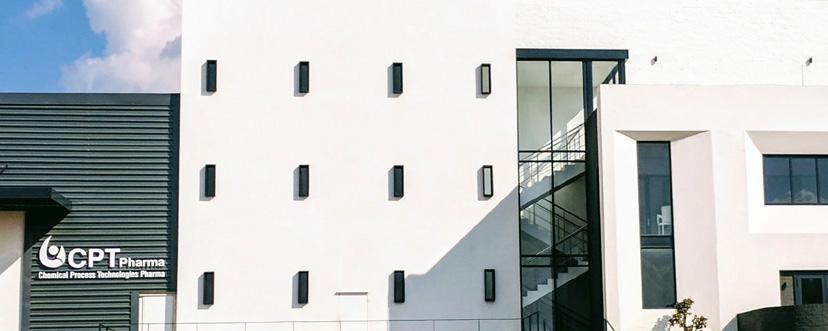

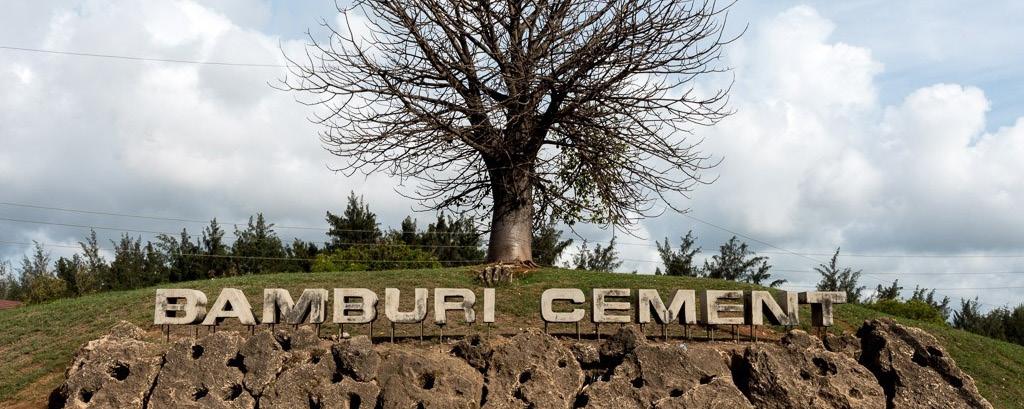


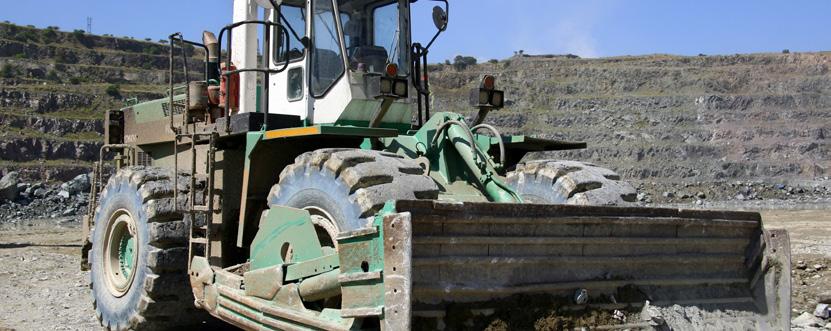
Editor’s Note 04 News 06 22 Dundee Precious Metals On Track for The Gold 16 Chemical Process Technologies Success through Innovation and Commercialisation 10 AB Inbev A South African Legacy 28 Bamburi Cement Set in Stone 34 Bestmed Protecting the people of South Africa 40 EQSTRA
46
Supporting South
contents 3
Rally the fleet
Foskor
African growth
GoodApp Empowers South Africans with Revolutionary Home Service Mobile App, Creating Opportunities for Local Service Providers
Just SA appoints Prof Prieur du Plessis as new Board Chairman in April 2023. With 3 decades of experience in financial services, governance, & education, he leads the company after achieving 270% growth in 3 years. Du Plessis succeeds Peter Doyle, as Just SA remains devoted to securing retirees’ better future.
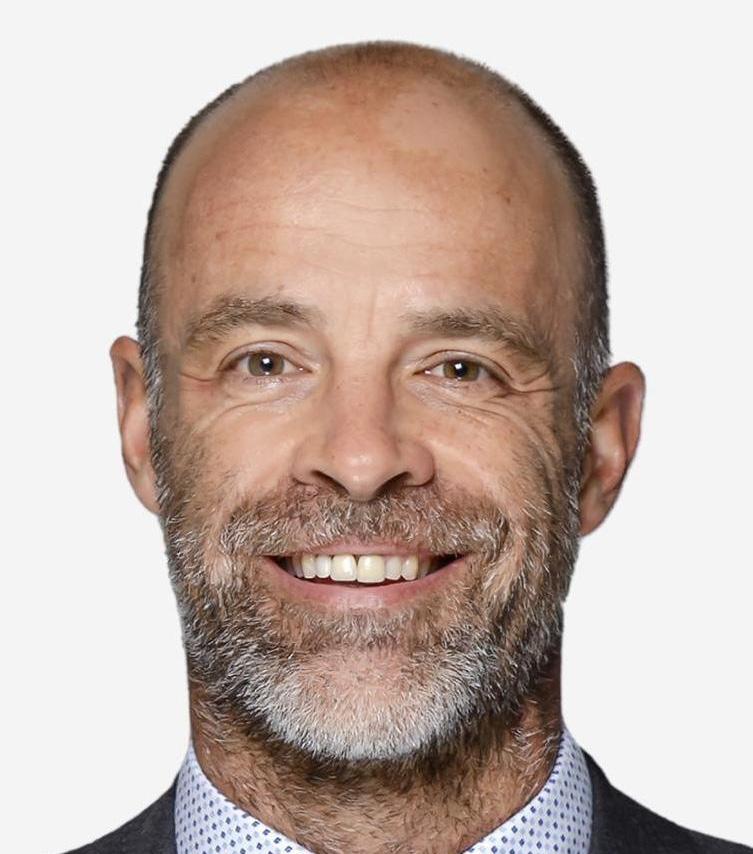
Just SA is delighted to announce the appointment of Prof Prieur du Plessis as its new Board Chairman, effective from April 2023. Prof du Plessis brings a wealth of experience spanning financial services, governance, and education, making him an ideal fit for the role. With over three decades of expertise in professional investment research and portfolio management, his knowledge and skills will be invaluable in guiding the company’s future.
Just SA has experienced remarkable growth, achieving a staggering 270% increase in the past three years. As a company that provides pensioners with guaranteed retirement income for life, its offering has become increasingly popular amid volatile investment markets and global uncertainties. Prof du Plessis’s appointment comes at a critical juncture, and his vision will undoubtedly contribute to Just SA’s continued success.
Prof du Plessis boasts an impressive background, holding the title of Doctor of Business Administration. He has previously served as the chair of the Institute of Directors in South Africa and currently sits on the Advisory Board of Stellenbosch Business School. As the founder and CEO of Plexus Holdings, an investment and governance consulting business, he has demonstrated his entrepreneurial acumen and commitment to excellence.
Having served as chair and non-executive director on boards and board committees of public and private companies, with a primary focus on the insurance and financial services sectors, Prof du Plessis is well-versed in navigating complex business landscapes.
Beyond his professional achievements, Prof du Plessis is an advocate for his country, holding the esteemed position of Honorary Consul General of Slovenia for South Africa. In this role, he actively promotes economic and cultural relations between Slovenia and South Africa. Additionally, as Deputy Dean of the Consular Corps of Cape Town, he collaborates with 54 countries represented in Cape Town to foster relations with local government and citizens.
Prof du Plessis succeeds Peter Doyle, whose insightful thinking and diplomacy have been vital to Just SA’s shareholders since the company’s inception. Doyle’s decision to step down from the Board is driven by his desire to have the freedom to visit his children residing in different parts of the world.
Deane Moore, the CEO of Just SA, expressed his gratitude to Peter Doyle for his invaluable contributions to the company’s journey to capital self-sufficiency. Moore warmly welcomed Prof du Plessis as the new Board Chairman, praising his championing of corporate governance and proven entrepreneurial track record. With this dynamic leadership, Just SA looks forward to a new phase of growth and fresh insights from its Board, while maintaining its unwavering strategic focus - to help pensioners achieve a better later life.
About Just SA: Just is a retirement income and life annuity
specialist, dedicated to meeting the unique needs of South African retirees. We pride ourselves on collaborating with best-of-breed independent asset managers and administrators to provide an enhanced value proposition, ensuring our clients receive top-notch service and tailored solutions.
Our journey in South Africa began in 2015, driven by a mission to address the shortcomings in the annuity market, as highlighted by National Treasury’s retirement reform papers and the precursor to the Default Annuity Regulations. In response, we meticulously designed features that set Just’s proposition apart, offering innovative solutions that fill crucial gaps left by traditional providers of life and living annuities in South Africa.
Just Retirement Life (South Africa) Limited is a registered life insurance company, subject to the rigorous regulation of the Prudential Authority of the South African Reserve Bank and the Financial Sector Conduct Authority. As an authorized financial services provider (FSP no. 46423), we adhere to the highest standards of ethics and professionalism.
We are proud to be a wholly owned subsidiary of Just Group plc, a renowned provider of retirement financial solutions in the UK. Our affiliation with this esteemed organization strengthens our commitment to excellence and enables us to draw upon extensive expertise and resources to serve our valued clients in South Africa.
At Just SA, our unwavering dedication remains focused on creating retirement income and life annuity solutions that empower South African retirees to enjoy a financially secure and fulfilling future.
4 news
news
GoodApp Empowers South Africans with Revolutionary Home Service Mobile App, Creating Opportunities for Local Service Providers
GoodApp Launches Innovative Home Service Mobile App to Empower South Africans and Generate Job Opportunities
GoodApp, the innovative home service mobile app, has officially launched, providing a safe and reliable platform that connects customers with trusted service providers. The app aims to empower South Africans by offering convenient and safe home services while also generating job opportunities for local service providers.
In today’s fast-paced world, convenience is key, and GoodApp delivers just that. With just a few taps on phone, one can book a wide range of home services, from beautician and massage services to
manicure and nail technology. GoodApp provides a platform for service providers to showcase their services and connect with potential customers. Service providers can increase their sales and expand their customer base while focusing on what they do best – providing high-quality services to their customers.
Safety is a top priority for GoodApp. All service providers are thoroughly vetted and backgroundchecked before they are allowed to join the platform. The app also ensures that service providers adhere to strict safety protocols, such as wearing masks, while providing services. GoodApp takes the safety of its customers and service
Advancing Africa Acceleration within the Digital Landscape of Africa
Digitisation has moved the needle for Africa. It has given the continent a voice, allowing us to connect between countries and the rest of the world without the hurdles of flights and accommodation costs that are unattainable for the majority.
Linda Snyman, Country Director of Invibes Advertising, discusses how the digital landscape has changed since joining the innovative technology company, “Digital has flooded the market. It’s cluttered, and people are bombarded with messages. The goal was clear when Invibes entered South Africa to establish its global footprint. To stand out from the clutter. To be different. Be better.”
Abey Mokgwatsane, CMO of Investec, highlights the shift in client expectations, “With the democratisation of content production and distribution, people’s behaviour and expectations have dramatically increased. Most digital media is irrelevant to our customer base, with online content increasingly framed by machine learning algorithms like Amazon’s product recommendations and TikTok’s intelligently curated feeds. The result is white noise in a fast-scrolling environment, with some customers adopting ad-blocking technology. Brands need to ensure we’re on top of these kinds of technologies and use data and insights strategically and effectively. More importantly, we need to make sure we deliver unique, impactful creative that resonates with our target audiences and rises above the noise.”
“Standing out on a continent with over 570 million internet users is challenging,” says Snyman. “South Africans spend over 9 hours a day online. When audiences scroll on social feeds, the ad-tocontent ratio can go as high as three to one.”
The Africa Lens.
Abey Mokgwatsane, CMO of Investec, holds Africa in high regard, “These days, just about everyone around the world has access to the same technologies, so tech has almost become a hygiene factor. One of the things we have going for us is the richness and diversity of our culture. The bizarre quirks of living in this country can sometimes be exasperating, but they also provide wonderful material for humour and great stories – two things we do particularly well.
It’s great to see these traditional strengths applied to emerging formats in social media and content marketing. The advantage of digital platforms is that they’re not one-way media. They are dynamic public forums that reflect the cultural discourse of the moment. Many of the best examples of great South African advertising are when brands hack topical trends and memes and adapt them to deliver a brand message, such as Engen’s recent Instagram campaign that plays on the Barbie selfie trend. From a technology perspective, some digital applications, such as M-PESA, have found resonance in emerging markets in ways they could never have in the developed world. To think that over 45% of Kenya’s GDP runs through M-PESA is extraordinary, showing that developing markets such as South Africa can be technology trailblazers too.”
Lean Forward.
Mokgwatsane cautions against a one-size-fits-all ATL-driven approach. “One thing that doesn’t work is approaching digital as a bolt-on to campaigns designed with traditional media in mind. Cutting down a TV ad for YouTube or resizing a print ad for Instagram is a recipe for irrelevance in the digital space. It’s not enough to understand your audience. You also need to understand each digital channel and how people use it. Brands that miss this can easily come off as inauthentic and out of their depth. Another pitfall is when technology is used irresponsibly or intrusively. Just because organisations can send thousands of clients an email or a text message with a single click doesn’t mean it’s a good idea. There are also examples of less-than-transparent brands using tech that try to pass off AI-generated fluff as thought leadership to boost their SEO. As in any medium, it’s important to respect your audience and be honest and true to your brand.”
Linda Snyman, Country Director for Invibes, talks about the impact of breakthrough digital advertising, “Within online platforms like the Sunday Times or Business Day, Invibes is able to target people who have leaned forward, who have chosen to go to a site to read information they
providers seriously, providing a reliable and secure platform for all users.
“We are thrilled to announce the launch of GoodApp, an innovative platform that connects customers with trusted service providers while also generating job opportunities for local professionals,” said Prakhar Srivastava, CEO of GoodApp. “We believe that everyone deserves access to trusted and high-quality home services, and we are committed to making that happen. With our innovative approach, commitment to safety, and dedication to generating job opportunities, we are confident that GoodApp will become the go-to platform for home services in South Africa.”
value and trust. They are already engaged. The ad units are developed to enhance the overall reader experience with attention-grabbing, engaging artwork and a strong call to action that combines video, carousel, static images and sound within the first paragraph.” Snyman says.
Be New. Be Fresh.
“Digital can be a powerful tool when the advertising is new and fresh, and the format differs from the daily messaging overload that people see. By spending resources on in-feed digital with creative and brand messaging designed to stand out, be memorable and motivate a click, you can reap the reward that more than makes up for the effort,” says Snyman.
“Invibes directly integrates with top-tier publishers like Arena Holdings and Caxton to track audience behaviour in real-time. What, when and where they are reading content. Our AI is smart. It can tell you who needs to wear glasses for people who zoom in, who are travelling when they go from one location to another, and when someone last upgraded their device. This live data matches brand messaging with audience behaviour and interests. Our AI is our superpower.” Snyman vaunts.
Pay Attention.
“The most important metric is attention. Invibes create impactful, rich ad units. Agencies can develop creative combining sound, video, and static images with big branding and logos. Content is at the top of the page and scrolls seamlessly in-feed to ensure people see ads that grab attention and enhance the reader experience. It’s different from programmatic advertising, which is volume inventory that people scroll past every day.”
Accelerate Africa.
Linda Snyman discusses Africa as the land to sow opportunity, “To accelerate, building connections across Africa will deliver growth. Organisations with a global footprint and a gateway to any market worldwide, including Portugal, the UK, Poland, Paris, Dubai, the Nordics and more, will have an advantage.”
news 5
A South African Legacy

AB Inbev
Donnie Rust

Easily one of the oldest companies in South Africa, SA Breweries, now AB Inbev, was founded in 1895, and is not only South Africa’s premier brewer but also an integral part of the social fabric of the country. Flourishing for almost a century and a half, the business has witnessed the most important changes in South Africa’s history as well as been ahead of many radical curves.
Politically And Professionally
Pioneering
SAB is known as a corporate trailblazer and adopted its first employment equity policy as early as 1971, making them a company focussed on the future and fairness. Considering the uncertain politics of the country during the time this was not only forward thinking but incredibly brave. In 2009, SAB tabled its broad-based black economic empowerment transaction, SAB Zenzele. Through its various corporate social responsibility programmes, SAB actively invests in community partnerships and works to promote socioeconomic and enterprise development to build a better and stronger South Africa. This includes supporting local farmers to establish thriving barley, hops, maize, and malt industries and investing in local suppliers
to promote enterprise development through business coaching and engineering support. Additionally, they invest in communities to promote and support sustainability education, safe driving, responsible drinking, and alternative energy use.
Further Commitments
Last year, South African Breweries (SAB) has reaffirmed its commitment to ignite economic growth in South Africa with a pledge to invest an additional 920 million rand ($63 million) into its Prospecton and Ibhayi breweries, boosting its total investment commitment for 2022 to 4.5 billion rand ($309 million).
According to Richard Rivett-Carnac, the company CEO, the beer industry continues to be a key contributor to the South African economy, citing a recently published Oxford Economics study which revealed the nation’s beer industry contributed 1.3% of the national GDP in 2019. At that time, the sector sustained over 248,000 jobs, which was equivalent to 1.5% of national employment. The tax impact was approximately 45 billion rand ($3.09 billion) in 2019, which was the equivalent of 3.3% of government revenue.
As one of the largest businesses in the country, Richard said SAB plays a significant role

8 Aruba Airport Authority
“the beer industry continues to be a key contributor to the South African economy”




www.pridemilling.co.za
A L W A Y S I M P R O V I N G T H R O U G H
I N N O V A T I O N

in igniting economic growth and recovery, “These investments will give us the capacity to not only contribute to the economy but also to be able to contribute to job creation, tax generation, and procurement spend.”
Commitments like these create direct and indirect employment opportunities and help SAB continue transforming the industry through partnerships with black suppliers, like HTP and Isanti Glass. Most of the investment will fund an expansion of the Prospecton brewery in Durban. The project is expected to add an estimated 3.1 billion rand ($213 million) in tax revenue and create up to 24,000 jobs throughout the value chain. Approximately 270 million rand ($18 million) were used to upgrade the Ibhayi brewery in the Eastern Cape.
Considering the economic impact of the COVID-19 lockdowns, Richard explains that SAB’s intention is to assist with economic recovery.
“The budget delivered by the Minister of Finance in February ensured that economic recovery was prioritized by keeping the beer excise adjustment closer to inflation,” he says, “This has provided us with the financial space to grow the beer category responsibly and aid our government in our collective mission towards economic recovery and growth.”
Investing In SA
Despite the negative impact of the lockdownrelated alcohol bans in South Africa – particularly in 2020 –Richard Rivett-Carnac and the CEO of their parent company Anheuser-Busch InBev (AB InBev) CEO Michel Doukeris have reiterated the group’s commitment to investing in South Africa, “We are at a pivotal moment after the last couple of years, but we are very confident about the way forward,” Richard says.
Speaking together, Richard and Michel are keen to demonstrate this commitment and emphasise the importance of continuing to grow the business across Africa, with SAB’s operations in South Africa as the base. Both are new to their roles, with both Richard Rivett-Carnac and Michel Doukeris taking their offices last year. And it has certainly proved to be an interesting time since then.
Since their respective appointments, they have taken the opportunity to relook at AB InBev’s African growth strategy through SAB and have seen enormous opportunity in Africa, and especially South Africa which fits in well with their growth strategies.
The opportunities he refers to include the
digitisation and monetising of the ecosystem within which the company operates. Richard suggests the rollout of digital technologies among retailers, taverns, and various other supply chain stakeholders across the continent. He
also refers to AB InBev’s $4.5-billion investment that was revealed at the Africa Investor Conference in March last year.
The Breweries
About R650-million has been invested at the SAB Prospection Brewery, in KwaZulu-Natal, to expand its facilities. This investment would generate 24 000 jobs through the full value chain, Richard said. A further R270-million will go towards upgrading the SAB Ibhayi Brewery, in the Eastern Cape.
Additionally, significant investment has been committed to bolstering the local bottle-making aspect of the business.
“During the pandemic, we learned a lot of things, one of them being that the beer industry is not recession- or pandemic-proof,” says Michel, “However, I believe we have earned our way to becoming an essential business.”
He explains that, during the pandemic, the beer company’s extensive logistics networks helped other businesses survive and continue to distribute products. It continues to help retailers remain in business particularly in more remote areas.

According to Michel, AB InBev’s strategy of buying the commodities that are needed to produce its products well in advance protect the company and consumers from sudden spikes in prices on the back of rising global inflation.
“We learned how much we can have a positive impact when we use our resources,” he reveals, “During those years we manufactured alcohol gel and hand sanitiser globally to donate during the height of the pandemic and facilitated blood donations, helped implement and educate on Covid-19 protocols, assisted with the building of emergency hospitals and clinics, and also helped campaign for vaccinations.”
Aruba Airport Authority 11
Success through Innovation and Commercialisation
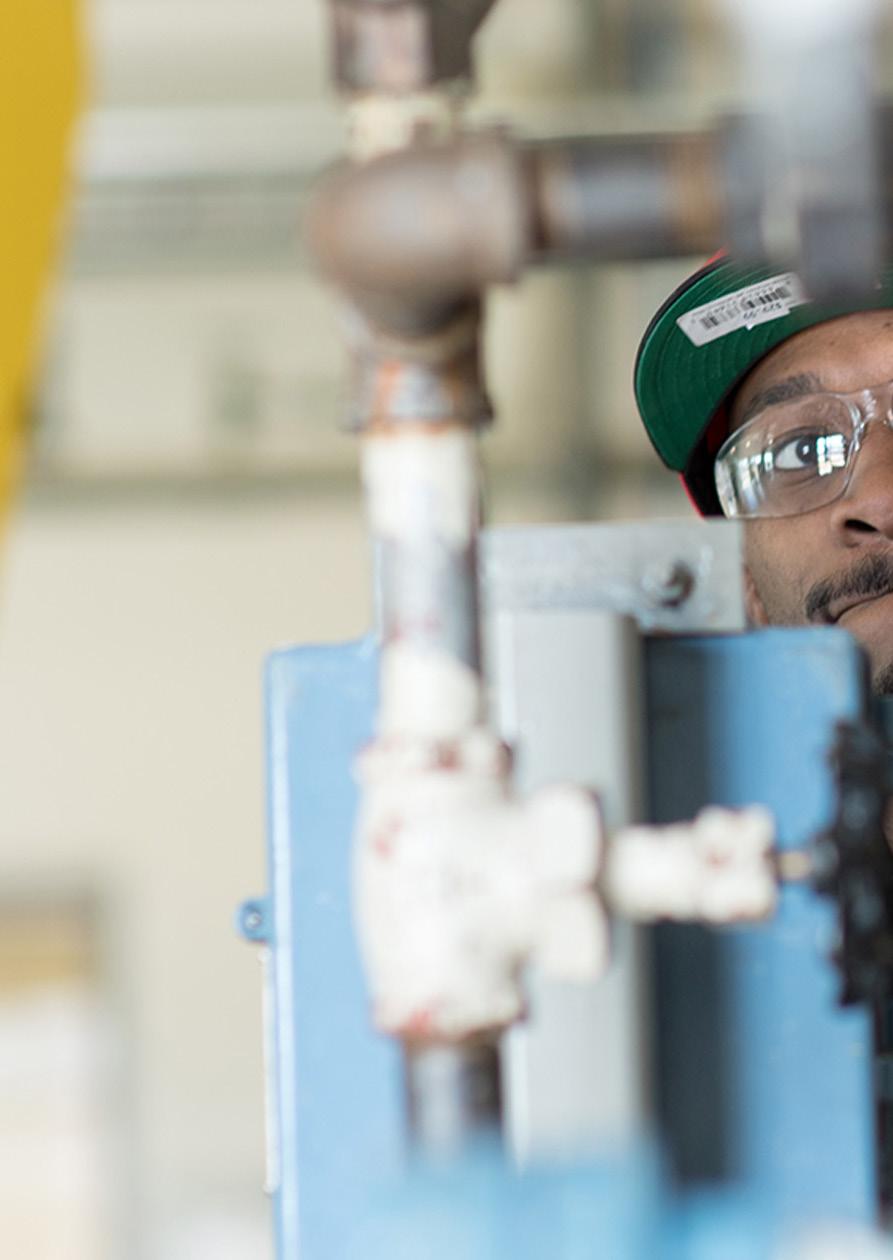 Donnie Rust
Chemical Process Technologies
Donnie Rust
Chemical Process Technologies
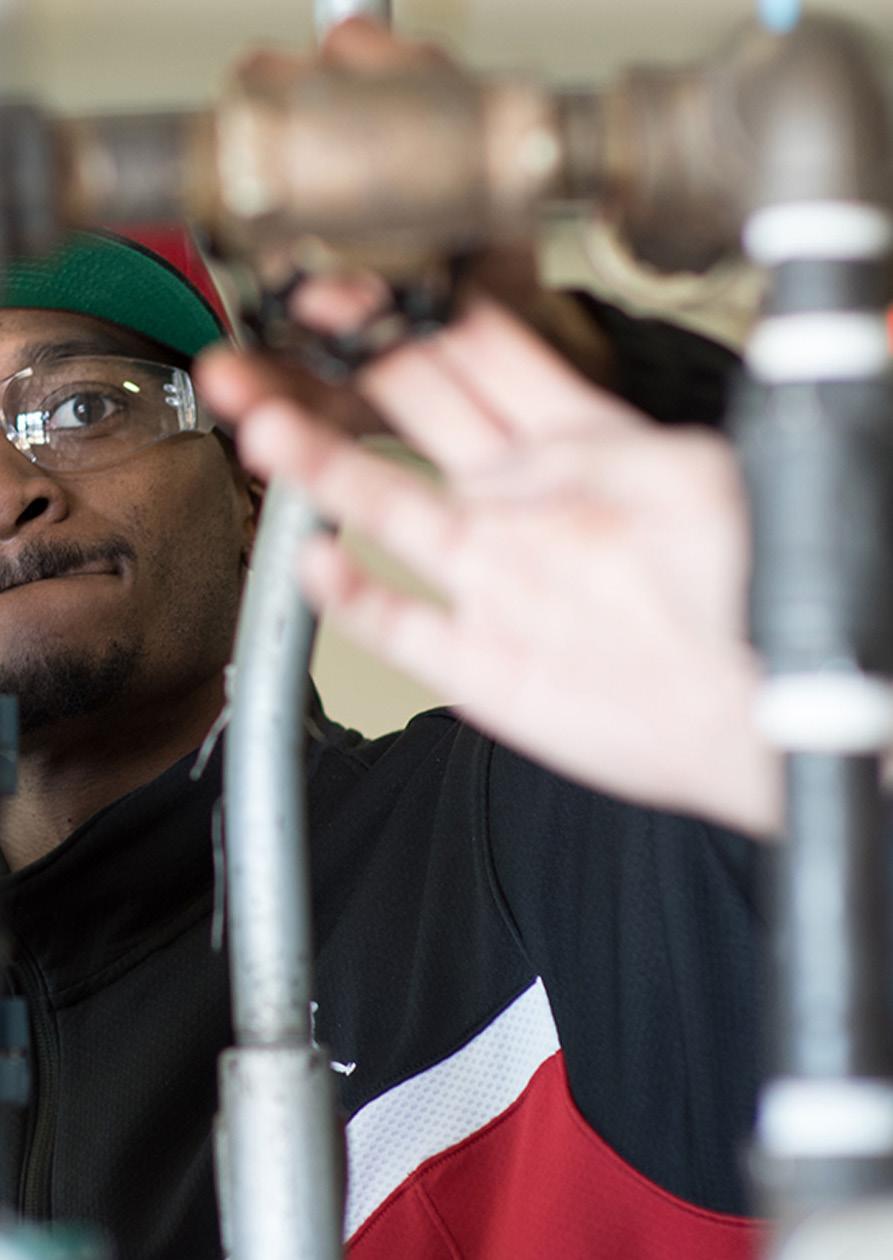
Innovators of specialist chemical synthesis, Chemical Process Technologies (CPT), based out of their sprawling 10,000m2 site in Waltloo, Pretoria South Africa, currently exports products to over 15 countries across five continents and has one of the most enviable cast of expertise and talent in the industry. Despite the trials of the Covid years, Managing Director Hannes Malan explains how a focus on quality and the ability to develop and commercialize technology keeps CPT ahead of their competitors.
Founded in 2001, Chemical Process Technologies employs 74 permanent employees and is a private chemical synthesis company within the animal health industry who also supply fine chemicals to various other sectors in a global marketplace. The company specializes in the synthesis, creation, of several fine chemicals and formulates numerous end-user products, which are exported to countries in Europe, South America, and Africa.
“Chemical Process Technologies is uniquely positioned when it comes to animal health in South Africa,” says MD Hannes Malan, “Thanks
to our combined capacity to synthesize active pharmaceutical ingredients and commercialise them into formulated products.”
In late 2020, CPT Pharma which is owned by Chemical Process Technologies was granted a license by the South African Health Products Regulatory Authority SAHPRA to manufacture APIs (active pharmaceutical ingredients) for the human medicine, which was a significant step forward for the SA pharmaceutical industry.
Active Growth
According to Hannes, CPT is an innovative chemical synthesis company with an enviable capacity and ability to develop and commercialise competitive organic synthesis routes. This means that CPT has the capacity to create various molecules, he adds, “In developing our own process technology there is a significant emphasis placed on current and environmentally responsible processes.”
Their team coordinates various chemical manipulations including oxidation, amidation, alkylation and heterocyclic chemistry, while
METAL TANK INDUSTRIES Interview with Rob MacGregor, Managing Director
technology for the commercial manufacturing of water-based nanomaterials is also something the company is involved in.
“We are always in the process of commercialising another API,” Hannes says, “We have almost finished developing the technology for a further three which we would like to manufacture locally and then export.”
On the API side there are significant opportunities for growth. Hannes explains that while the number of animals in South Africa is staying largely the same, which results in the market almost being fixed, that they are still able to improve their share of it.
“We achieve this by providing our renowned excellent service and also by means of the quality system that we’ve implemented and embedded within the company,” he says.
Despite limited expansion opportunities, Hannes still sees possibilities and prospects in the provision of active ingredients. He adds that this is a company priority, “Because these are not used only in South Africa but also in a fair number
Thanks to an entrepreneurial spirit and an all-encompassing approach to business, South African tank manufacturer, Metal Tank Industries has found itself well placed to capitalise on the boom experienced within the hygienic, pharmaceutical, cosmetic and food and beverage industries. As the go-to partner for businesses within these sectors, managing director Rob MacGregor reveals to African Business Pursuit, that they are being kept busy.
“Currently we are experiencing buoyancy in all sectors,” he says, “As we work hard to keep ahead of the growth of our longstanding clients.”
Relationships
Heavily focused on export throughout countries south of the Sahara such as Zimbabwe, Botswana, Uganda and Malawi as well as Namibia and of course South Africa, Metal Tank’s ability to offer high quality services across a range of manufacturing needs is thanks to the twenty six years the company has spent building meaningful relationships with clients and, fundamentally, staff.
“We like to keep hold of our people,” Rob explains, “And have team members that have been with us for over fifteen years and companies, such as Chemical Process Technologies who have been collaborating with us for over twenty years.”
This kind of relationship means a couple of things. Firstly, Metal Tank have an intimate understanding of their clients’ needs and are on a first-name basis that allows them to offer honest expertise and evaluations. Secondly, having this sort of relationship with fast growing businesses like Chemical Process Technologies means that they are adept at keeping pace with trends, changes and new developments. Thirdly, clients bring their challenges to Metal Tank, which has helped them expand their range of services so that when all the verticals are offering opportunities (as is the case now), they are in the position to accept.
“None of which would be possible without our team working together and making full use of their faculties and expertise,” Rob adds.
Projects
It has been a busy year. Metal Tanks have been involved in a number of project upgrades with CPT (Chemical Process Technologies) involving the redesign of reactors, blenders and pipework. They were awarded a large contract for an oil and lube company in SA to expand their plant, as well as being involved in the installations of a number of brewing plants in Zimbabwe and Zambia specialising in traditional beverages. This has led to new developments in greenfield opaque beverages that have taken Metal Tank Industries to countries like Mozambique, Angola and Tanzania.
Inhouse Developments
Rob reveals that over the last couple of years Metal Tank Industries have expanded to integrate the latest technology in “vertical tank building”. This included the purchase of highly specialised European equipment from Italy and Austria, and as far as he is aware they are the only tank manufacturer in Africa using this technology. The traditional boilermakers use a roll-and-stack method with sheet metal to create a cylinder, which is later shaped. Whereas vertical tank building takes material from a steel mill in a continuous roll and creates one single automated weld cycle. Plates aren’t used, and the automated welding creates a continuous seam, providing greater weld precision.
“It’s an example of how we like to keep our facility as self-sufficient and in-house as possible,” Rob says, “This allows us to manage our quality and grow ahead of our client’s needs. This way, when they need something done, we can do it.”
14 Chemical Process Technologies

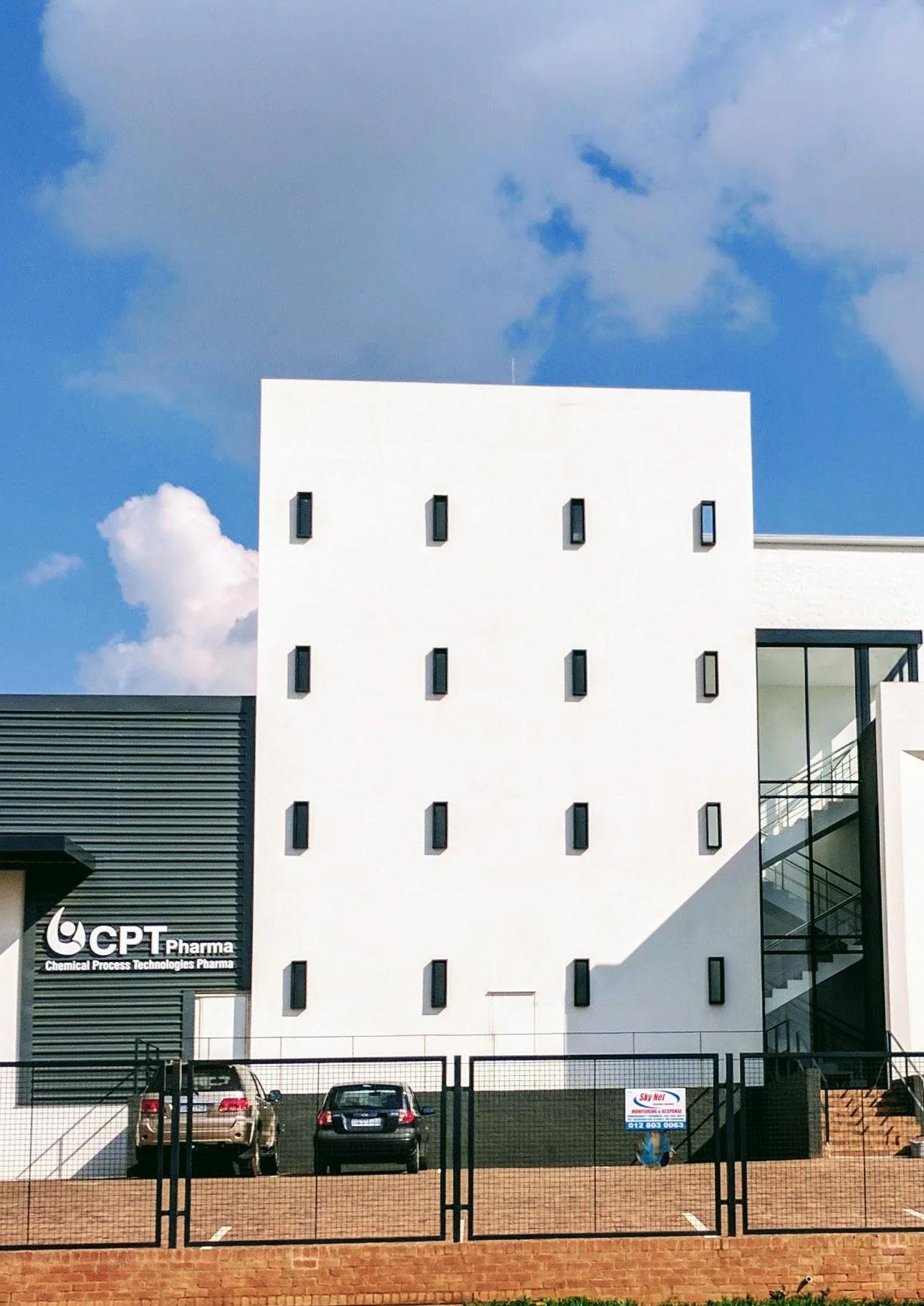
Chemical Process Technologies
of other countries in the southern hemisphere, that is the area on which we are focussed. To commercialise the technologies that we have developed as quickly as possible so that we can supply more and more to these countries.”
He goes on to explain that on the formulation side, it is with local formulators for final product that CPT are having to compete, “Again, the quality systems that we have implemented are important in keeping us ahead. Multinational companies have the same quality system and standards on the animal health products as on the human side, and we have moved a long way down that route ourselves. We are in the process of executing a project to upgrade one of our facilities to be GMP compliant- set to be executed by the third quarter, which will set us apart from any of our competitors in South Africa, most of whom are still adhering to far more lenient local regulations.”
This willingness to invest and continually improve their systems will stand them in excellent stead and the GMP facility will also open further export opportunities which are currently unavailable to them.
Maintaining Competitivness
The flexibility build into CPT’s manufacturing systems is an irreplaceable component to the success of the company’s ability to formulate. Although, this does come at a price.

“Our business is seasonal,” Hannes says, “And it is almost impossible to guess when customers will need our product. This makes things difficult as the lead times on a lot of the raw materials that we import can be anything from six to twelve weeks, and opportunities do not wait around for that sort of timescale.”
They have built and tweaked certain aspects of their business to give the flexibility to ensure that they continually have enough of those required raw materials in place, aided by good relationships with their suppliers assisting them in short lead times for local deliveries.
CPT’s willingness to adjust their product plan to align with their customer’s priorities has, in turn, positioned them superbly well in the south African industry.
From the chemical synthesis point of view, there is nobody else doing what CPT are doing in South Africa which is, according to Hannes, another vital differentiator.
“Our competitors are all located in India and China,” he says, “Our technology sets us apart from them, however we still import most of our raw materials from the same supplier that they are using, therefor our approach, typically, is to look at the molecule that we believe to be of value and then see if there is anything we can do around the technology to allow us to manufacturer the product locally and at a better price.”
Having the ability to develop and commercialise technology is what they use to remain competitive against those countries. Going through the process of scaling up and commercialising is a painful and challenging route, says Hannes, but he is convinced that it is the only real way to maintain independent and competitiveness in the chemical manufacturing industry.
Recently, the company has benefitted from a boom rather than a bust, giving the global crisis everyone went through three years ago. It turned out to be a good time for agriculture - food supply has of course been very important and there have been favourable conditions in the industry which has enjoyed a growth of around 24%, which CPT really benefitted from.
On the human side, Hannes said, what was most significant was the boost in interest in local manufacturing and there has been a lot of interest from the south African government and donor organisations that would like to ensure Africa’s independence when it comes to pharmaceutical products
Chemical Process Technologies 17
Atlas Tower
Sparking up conversation
Giving South Africa access to reliable wireless connectivity is more than a gift, it’s a necessity in today’s increasingly online world and Atlas Tower is doing more than most to keep the country connected.
Editorial - Victoria South

Atlas Tower entered the South African market back in 2013. It had one goal: to capitalise on the potential for increased wireless capability in a country that is becoming ever more reliant on mobile communications. As a business prospect, South Africa holds a lot of promise, particularly for connectivity due to the rising numbers of mobile users.
The rise in use can be attributed to several things. Chief amongst them is an increase in app-based services, including health care, that offer fast access to necessary information and support. Utility providers are increasingly moving their client interfaces to app-based systems and away from conventional call centres, in a bid to save costs, with banks following suit. Internet access is fast becoming more essential than a phone line. Younger generations are purporting this trend even more.
Predictions state that data use is going to increase by sevenfold, by 2024. Much of this will be facilitated by younger mobile users who are adept at online interactions and using them as a primary form of communication. Because of this, the need for increasingly reliable and widespread connectivity will only ever grow. As a market leader, Atlas Tower has identified and reacted to this trend and is solidifying its presence in South Africa.
Embracing Africa early on Atlas Tower was founded in the U.S., where connectivity is king, back in 2007. The internet was up and running and mobile phones were becoming an everyday accessory for all, but rolling out effective connectivity would prove crucial in the trend continuing to become

Atlas Tower 19
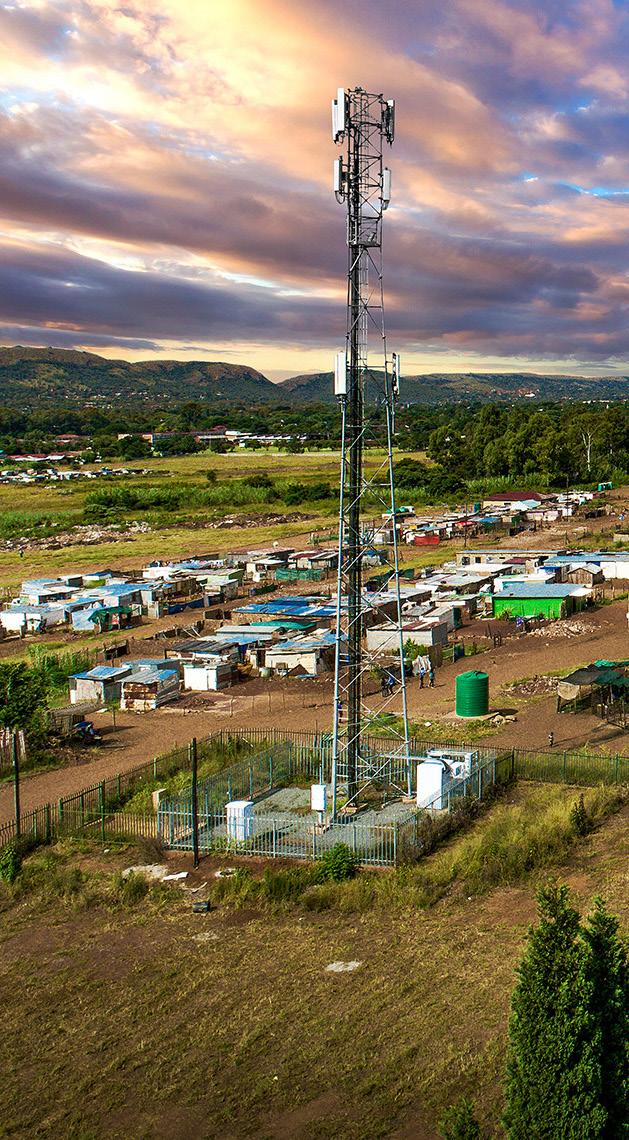
20 Atlas Tower
“…landline communication has never played as important a role in African households as it has in European and American ones.”
as huge as it is today.
Africa was instantly identified by Atlas CEO Nathan Foster as a growth market and an opportunity to leverage expertise in a burgeoning sector for the benefit and enrichment of many lives. Where others may have been afraid to embark on a commercial venture on a new continent, Foster was familiar with Africa and keen to get ahead of the competition,

“In 2013, we began exploring African markets,” he said in a previous interview. “While our competitors in the US were looking south, we believed southeast had more options. Generally speaking, Africa is skipping some steps in the traditional first world telecom and connectivity calendar – landline communication has never played as important a role in African households as it has in European and American ones. Wireless communication has therefore sprinted to the forefront and is as vital in Harare as it is in Manchester.”
To some competitors, making the move into Africa might have come from left field. Initially, Tower was
engaged in developing connectivity for wealthy communities in the U.S. Having overcome industry difficulties on home soil, however, Foster was certain he could replicate the company’s success abroad. As it transpires, he was correct to have faith in himself and his business acumen.
Today’s telecommunications giant Through careful expansion, Tower now owns and operates more than 1,000 macro towers across the globe. The majority can be found in South Africa. Each is designed to work with a full spectrum of mobile providers, from large international outfits to smaller, independent offerings. WIFI providers are also able to leverage the towers for their own infrastructure. Always keeping an eye on the future, Tower has positioned itself in regions that it predicts will see a leap in connectivity demand, in the future, “Most competitors buy tower assets from mobile network operators, a model that we generally do not subscribe to since it does not provide enough siteby-site value. Thanks to our proprietary
methodology, we believe we have some of the most valuable sites on the continent, positioned to be critical to the growth of the next generation of wireless networks,” Foster commented.
How has Tower been able to locate so favourably? By using a combination of planning knowledge and regulatory awareness. Having always been focussed on the development of cutting-edge infrastructure, Tower keeps itself educated as to new developments in planning laws. It also sidesteps competitor methodologies that see inexperienced companies seeking to profit from existing, outmoded towers. When Foster says that the company is built on years of planning experience, he isn’t overdramatising. More than half of his staff have formal town planning and land development backgrounds. This allows for nimble operating that is proactive, not reactive.

Branching out
Having replicated his successful U.S. business model in South Africa, Foster is looking ahead to new challenges,
Atlas Tower

22 Atlas Tower
“We want to give people equal access to all the networks so they can freely pick the best one to navigate the millions of data that can inform, teach, and educate the population. The new world of wireless connectively, ultimately, will improve the economic position of people in all communities,” he said in a statement.

Expanding into new regions is a top priority for Tower, though this will bring new and unforeseen challenges, following the Covid-19 pandemic. Where once cheap raw steel simply an easy to source material for tower construction, now it is part of a global supply chain backlog. Similarly, manpower risks being reduced without notice as new Covid variants continue to add pressure to already under-pressure industries.
Foster is not deterred by potential stumbling blocks. He has a vision and believes that creating the right infrastructure that will allow the entire world to get online is critical. He likens the endeavour to driving. He says that while the cars being used to travel from one place to another can change frequently, the roads remain the source of access and freedom. Similarly, while mobile providers may come, go and evolve, connectivity infrastructure will always be needed to let them operate and give people access to the information they need.
Foster says that he has learned a great deal from his dealings in South Africa and plans to use them as case studies for his continued geographical expansion beyond the country’s borders.
Atlas Tower 23
Bamburi Cement
Set in Stone
Bamburi Cement stands proud as Eastern Africa’s leading cement company and is looking to retain its title through increasing adoption of sustainable practices and innovative solutions for tomorrow’s construction needs
Editorial - Victoria South

Bamburi Cement is part of the Holcim family, which is reportedly 70,000 people strong. Encompassing some of the most trusted brands in the world, including Firestone Building products, Geocycle and Holcim and Lafarge, the group is an undisputed leader in sustainable building solutions.
“Holcim is enabling greener cities, smarter infrastructure and improving living standards around the world,” Bamburi iterates. “With sustainability at the core of its strategy Holcim is becoming a net zero company, with its people and communities at the heart of its success. The company is driving the circular economy as a world leader in recycling to build more with less.”
Bamburi is a key part of the Holcim portfolio. It is slated as working with a full complement of professionals across the building industry, discriminating against none. DIY enthusiasts to large construction outfits and everybody in between is catered for with high quality cement ready to deliver at a moment’s notice. The company even works with local artisans.
On a mission to delight
Bamburi claims to be working alongside a vision of delighting all of its customers. That could sound like a stretch for a cement supply outfit, but in reality the material is the building block of innovation. If Bamburi can offer the best quality products, alongside considered expertise and innovation where needed, it will meet its mandate of delightful reception with ease.

With more than 800 employees, spread across five locations, Bamburi has secured excellent presence within its sector. It has also diversified to
encompass a wider share of the market. Bamburi Cement operates out of two plants, in Mombasa and Athi River, while Bamburi Special Products, a wholly owned subsidiary, develops readymixed concrete and precast blocks. A Uganda-based subsidiary called Hima is in place to add geographical cover and Lafarge Eco Systems focuses on sustainability and quarry rehabilitation. This last element is a particular point of pride and, “provides market leadership in environmental responsibility as well as a point of engagement for neighbouring communities and other stakeholders.”
Four pillars of success
Bamburi cites four individual yet interconnected divisions as being instrumental in its growth within the construction supply sector. It works with cement, aggregates, ready-mixed concrete and other construction materials. These concerns are all supported by quarry ownership, people empowerment and a focus on environmental responsibility. These elements combined are what makes it stand out in a competitive field, but there is another driving motivation. Bamburi has been vocal about its desire to become synonymous with safe working conditions.
Extending its safety commitments outside of operational plants and offices, the company looks to implement change across its entire supply chain and throughout every region it works in. It claims to have implemented numerous initiatives, to attain the highest possible levels of health and safety compliance. As a result, Bamburi is considered to be, and marketed as, one of the world’s safest places to work.
Bamburi Cement 25


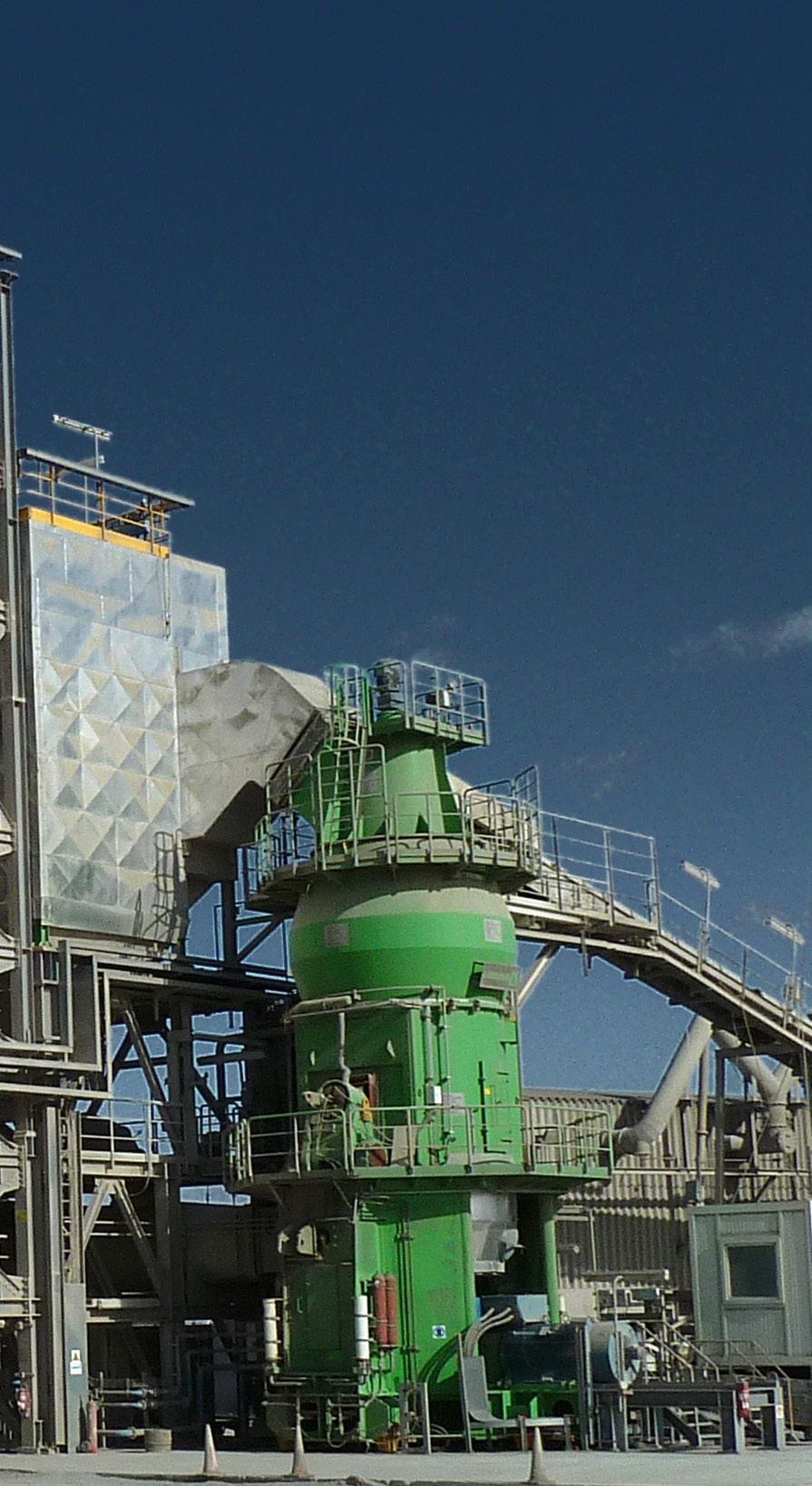
Globally recognized technology in its most compact and modular form www.loesche.com A LOESCHE CCG in Tarfaya, Morocco STATE
THE ART
LOESCHE
OF
CEMENT PRODUCTION WITH
VRM s
LOESCHE COMPANY PROFILE
LOESCHE’s core competence is the development and design of individual concepts for dry-grinding plants with vertical roller mills in the cement, metallurgical, power plant, ore and mineral industries. The portfolio extends from first concept to the commissioning of complete plants. In addition, LOESCHE offers a wide range of services, including maintenance, repair, spare parts procurement and training as well as modernization, optimization and digitalization of grinding plants. Furthermore, LOESCHE offers various concepts for plant O&M.
Together on a future-proof path
Founded in 1906, LOESCHE has evolved over the past decades from a mill manufacturer to a provider of innovative and sustainable solutions. In the last 25 years, the careful use of resources and the sustainable use of industrial by-products to reduce CO2 emissions in industry have become increasingly important. LOESCHE has risen to these challenges. Thus, scientists, building materials experts and heat engineers have been recruited and the LOESCHE Test Center in Neuss has been expanded.
The development of complete processes, including new and further developments in mechanical engineering, is now part of the LOESCHE portfolio: LOESCHE has continuously improved its main products, the vertical roller mill (VRM) and plants, especially with regard to mill capacity and energy efficiency. At the same time, the company has developed resource-saving technologies and processes. In addition, LOESCHE has expanded its competencies and knowledge through vertical integration and strengthened the worldwide LOESCHE Group by acquiring companies:
A TEC: is an engineering and technology company focusing on optimization and efficiency improvement of cement plants. A TEC’s expertise lies in the areas of pyroprocess technology. This includes, among other things, the optimization of preheaters and the installation of bypasses.
aixprocess: offers industrial process modeling and simulation technologies for various applications, including process design, CFD services, computer-aided engineering, virtual reality, Big Data analysis, and real-time process optimization as part of the Internet of Things (IoT) and Industry 4.0.
kingsblue: provides software and services that simplify, transform and analyze data to enable plant operators and managers to achieve their operating cost and availability goals.
Dynamis: is the youngest member of the LOESCHE family since 2021 and offers innovative technologies that ensure high energy efficiency and sustainable use of resources. Dynamis is known worldwide as a specialist in the field of clay calcination.
For LOESCHE, CO2 reduction and the production of cement composites have priority. Together with Dynamis, the company has already developed and commissioned several solutions for the production of calcined clay.
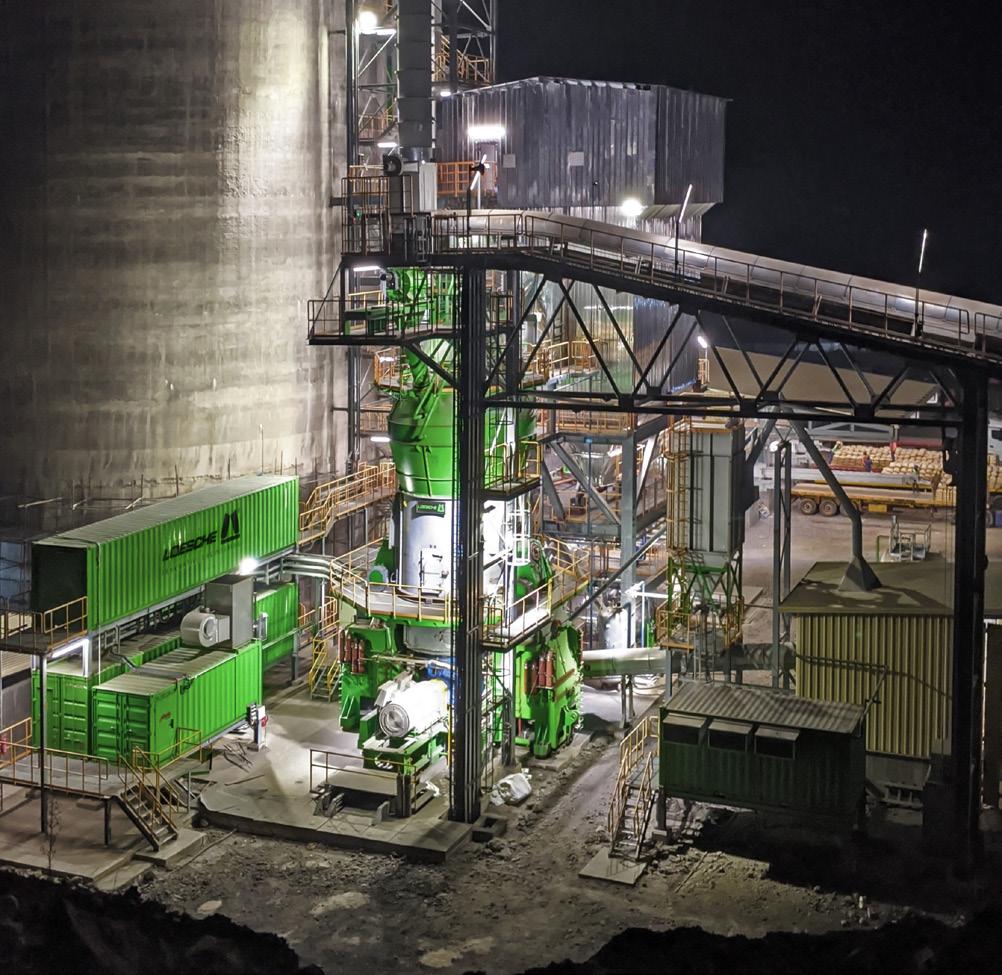
In addition, LOESCHE is conducting research in many other areas, such as concrete recycling, the use of steel slag as a supplementary cementitious material (SCM), and the production of ultrafine materials.
In the coming years, LOESCHE will continue to intensively research and develop technologies as well as bring innovative concepts to industrial maturity in order to offer a wide range of sustainable solutions.
In order to counteract climate change, the industry, above all the cement industry, must save even more resources in the future and drastically reduce its CO2 footprint. LOESCHE is already developing technologies that optimize the production process, save energy and reduce emissions. In addition, Industry 4.0 and the digital transformation will increasingly find their way into the cement industry.
LOESCHE GmbH is an independent family-owned company, certified according to DIN EN ISO 9001, with headquarters in Duesseldorf, Germany. It is present worldwide with more than 700 employees, subsidiaries in the USA, Brazil, Spain, Great Britain, South Africa, India, China, the U.A.E., Russia, Indonesia and Austria as well as agencies in more than 30 countries.
For more information, please go to www.loesche.com.
LOESCHE GmbH, Hansaallee 243, D-40549 Düsseldorf Tel: +49-211-5353-0 | Fax: +49-211-5353-500 email: marketing@loesche.com | www.loesche.com
In terms of environmental sustainability, Bamburi notes that this is not to be treated as an empty term. There is. Company culture in places that reaffirms that how we act and what we do now impacts future generations and stands as our legacies. As such, the company seeks to make positive choices and is working towards ambitious sustainability goals.

“Our focus continues to be on building sustainable relationships with our stakeholders at local and national level. As a member of the LafargeHolcim Group, we have entered a new phase in our sustainability commitment with the launch of “The 2030 Plan’’, the new Sustainability Strategy,” Bamburi notes. “The sustainability ambitions are organized around the three main pillars of sustainable development - social, economic and environmental: coupled with demanding quantitative targets. We firmly believe that a responsible company has an active role to play in the development of the communities within which it operates in. The implementation of proactive measures in favour of sustainability creates value not only for its shareholders but also for its teams, its customers and the community at large.”
Bamburi is not simply paying lip service to environmental innovation. In February of this year, it revealed that it had signed a solar power purchase
agreement with MOMNAI Energy, in a bid to reduce its dependence on conventional electricity supply. It marks a considered move towards the use of more renewable energy in a variety of applications and has been predicted to incur operational cost savings of up to 10 percent. Moving to solar power will contribute meaningfully to the wider Holcim net zero pledge.
Powering ahead into 2022
There’s no denying that Bamburi is part of a wider group that commands respect and enjoys a legacy within the construction world. It would be easy to simply rely on this reputation and not seek to innovate or implement positive change. However, that isn’t the Bamburi way. To be successful, constant evolution is necessary and the company is certainly embracing that mantra.
In December last year, Bamburi revealed it was working with a number of other professional operations to launch Women on Wheels. A female-centric training and recruitment program, the initiative seeks to encourage more women to enter the trucking sector with confidence. It comes as women were identified as representing just 10 percent of the public transport workforce. The project was devised and launched as part of Bamburi’s ongoing sustainability objective, focusing on diversity concerns.
In product news, the cement giant has just unveiled a new tile adhesive line that has thrust it into the specialist mortar sector. Speaking at the time of the launch, Fidelis Sakwa, head of innovation and technical services for Bamburi said: “Innovation is a key lever in the company’s Building for Growth strategy, and today’s milestone is a result of continuous investment in research and development coupled with paying close attention to our customer’s needs.”
Instead of relying on a legacy, Bamburi is continuing to build an increasingly impressive one. That promises to make 2022 an interesting year.
28 Bamburi Cement
“The implementation of proactive measures in favour of sustainability creates value not only for its shareholders but also for its teams, its customers and the community at large.”
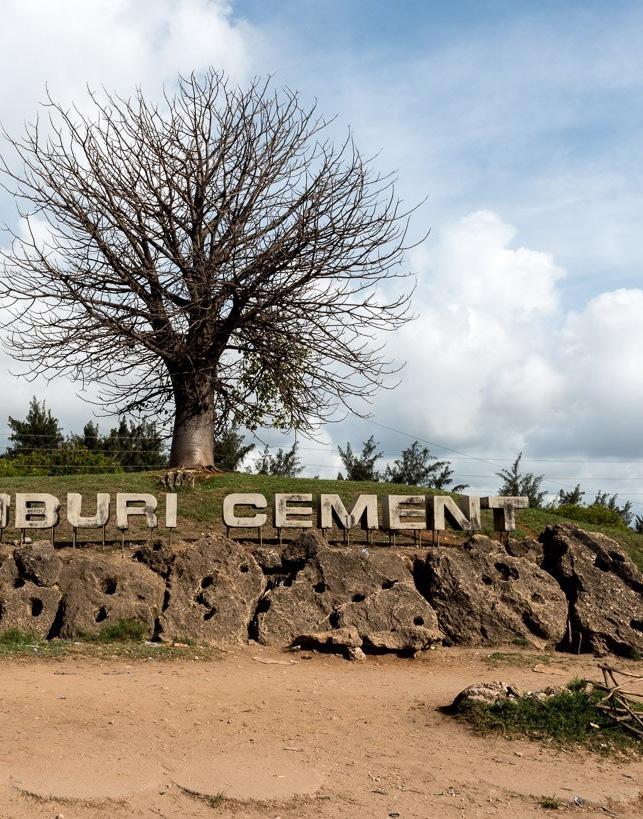
Bamburi Cement 29
Protecting the people of South Africa
Medical schemes have the opportunity to change people’s lives on both small and large scales and offer the most comprehensive medical cover available, which is why Bestmed is ensuring that South Africa has access to an industry-leading platform of services.
Editorial - Victoria South

Bestmed
South Africa is reliant on its people being able to leverage medical support as and when needed, but not all services are created equal. Despite the Medical Schemes Act stating that all services need to comply with certain regulations, corners are frequently cut, leaving scheme participants short-changed in the case of an emergency. Bestmed does not subscribe to this way of operating and instead, set itself apart as the benchmark for all others.
“Medical schemes have to comply with the Medical Schemes Act and are governed by the Council for Medical Schemes (CMS),” Leo Dhlamini, CEO of Bestmed said. “This ensures the protection of consumer interests at a high level. As a result, medical schemes are required to provide full cover for medical emergencies, as well as a list of 270 life-threatening conditions, which are referred to as Prescribed Minimum Benefits (PMBs), as well as a list of chronic conditions, such as diabetes, asthma or hypertension. This cover and associated benefits apply to all members of medical schemes, including hospital plans. Bestmed continuously looks for opportunities to improve our services, broaden our network of healthcare providers, and establish our competitive position in the country to the benefit of both our members and service providers.”
Bringing everything into one package
As the largest self-administered scheme in South Africa, Bestmed is wellpositioned not only to offer continuously relevant enhancements to its product offering but also to remain responsible for the membership’s day-to-day

needs. This also allows the company to control and contain its costs so that the maximum amount received as contributions goes towards paying claims and not administrative costs.
Preventative care is recommended for all beneficiaries so as to save on potential greater expenses due to illness. The scheme, therefore, continuously negotiates the most affordable healthcare benefits, including preventative care benefits, on behalf of its beneficiaries without compromising on the quality of care, with its countrywide network of service providers. One of the biggest innovations is the Tempo wellness programme, to which all scheme members gain free access. Beneficiaries need only complete a free Health Assessment at a network pharmacy to unlock their Tempo wellness programme benefits. These benefits include consultations with a dietitian and a biokineticist, to assist beneficiaries to live a healthier lifestyle. A range of group classes are also offered throughout the year to help encourage and support a healthier lifestyle, regardless of a people’s age or health status.
Putting people first
Customer service is more than a business buzz term to Bestmed, as Dhlamini explained. “Bestmed was measured alongside five other large medical schemes and rated the highest overall in the South African Customer Satisfaction Index (SA-csi) survey for 2021. Our members have testified to our Personally Yours service. We also had the lowest number of complaints in the industry.” He continued, “We complete annual organisational culture surveys
Bestmed 31
and again achieved very high results measured against the industry norm in 2021. We look after our employees, so they enjoy working for the scheme and looking after our members. We are in the business of saving lives and our employees take this very seriously. Happy employees equal happy members.”
Dhlamini goes on to explain that maintaining a tight grip on value for money is essential in the medical scheme industry. Bestmed has consistently kept its contribution levels now, with no reduction in benefits.
Bestmed has won a slew of awards for its service in the past, but these are not the driving motivator for the team. Dhlamini acknowledges that awards look good to the public, offer confidence to existing scheme members and can draw new sign-ups. Growth remains a bigger priority than accolades, however.
“During 2020, Bestmed’s stable membership, coupled with new enrolments, resulted in a net principal member growth for the 2020 financial year. Bestmed was the only scheme in the top five open medical schemes in South Africa that grew in membership during 2020. Despite economic

difficulties in South Africa, Bestmed was the only medical scheme that showed growth. The Scheme grew by 2.4%, while the industry decreased by an average of 2.9%. During 2021, Bestmed reached its milestone of 100 000 principal members. The scheme intends to maintain the momentum in order to end the 2021 financial year with another positive net member growth.”
Meeting COVID challenges
The pandemic had a huge effect on the healthcare industry. Virtual consultations became the order of the day and members could (almost) order their medicine to be delivered to their homes. Apart from realising the importance of belonging to a medical scheme, members became aware of what their benefits and rights are. A primary concern was that their healthcare needs would be taken care of should they be diagnosed with COVID-19. Regular communication and publications in the media, and from schemes themselves to members, ensured everyone was updated on the pandemic developments, and their rights and privileges. It remained crucial for schemes to communicate the actual benefits funded to ensure that no
32 Bestmed
“Bestmed continuously looks for opportunities to improve our services…”
PPN the Optical Network of Choice
Providing Bestmed members with a unique benefit design and competitive pricing :
• Any beneficiary of Bestmed who requires optical assistance can consult with an optometrist.

• 100% cover for consultation including Artificial Intelligence screening to identify certain health conditions.

• 100% cover for clear prescription lenses in either Single vision or Bifocal or Multifocal design for certain options.
• A generous frame benefit value that can be used to either fund a new frame or used to offset co-payments for lens enhancement selected by members.
Through the PPN Optical Benefit design, members can access their optical benefits at a network optometrist without a co-payment. Members are encouraged to engage their optometrist to explain their optical account and the reason for any co-payments. Scheme Rules apply.
B-BBEE Level 1

Bestmed
www.ppn.co.za | info@ppn.co.za
misleading impression was created that all and every treatment would be funded if members were diagnosed with COVID-19.
Bestmed maintained its awardwinning customer service by mobilising its team to work from home. The transition was completed relatively seamlessly and throughout national lockdowns, the scheme was fully operational. Flexibility proved key and Bestmed devised a lower cost service that allowed members struggling financially an option to remain covered for a smaller investment. South Africans recently experienced the fourth COVID-19 wave, and the country is holding its breath, waiting for certainty about the efficacy of the COVID-19 and booster vaccines. Bestmed is confident that the country will attain population immunity, but fears of potential infection and an increase in the burden of disease will linger, and the economy will remain fragile for some time to come. Medical schemes will, therefore, continue to grapple with loss of income among their members during the transition to the “new normal”.
“Whatever the future brings, we have the rock-solid certainty that Bestmed’s members will continue to experience the peace of mind of knowing that their medical scheme will carry on caring,” Dhlamini commented.
Looking to the future
Bolstered by a team of dedicated professionals, many of which go on to participate in leadership internships for promotion, Bestmed is ready to learn from testing years and stride ahead with optimism. Amongst the major developments for the company is creation of a low-cost benefits package to secure new members despite financially challenging times.
Bestmed is also working on extending business hours on weekdays and over the weekend to ensure continued access to services during these times. Its plans for 2022 and beyond also include leveraging off technology to optimise operational efficiencies, such as integrated online membership applications and healthcare services pre-authorisations. This comes as an add-on to the multiple responsive communication tools already in place. An app, chat service and manned contact centre mean that customers never struggle to get through to a real human with industry knowledge.
One of the few organisations that managed to not just survive but thrive during the pandemic, Bestmed is an example of how putting people first and staying true to a mission and mandate can yield impressive and lasting results.

34 Bestmed
“We are in the business of saving lives and our employees take this very seriously. Happy employees equal happy members.”
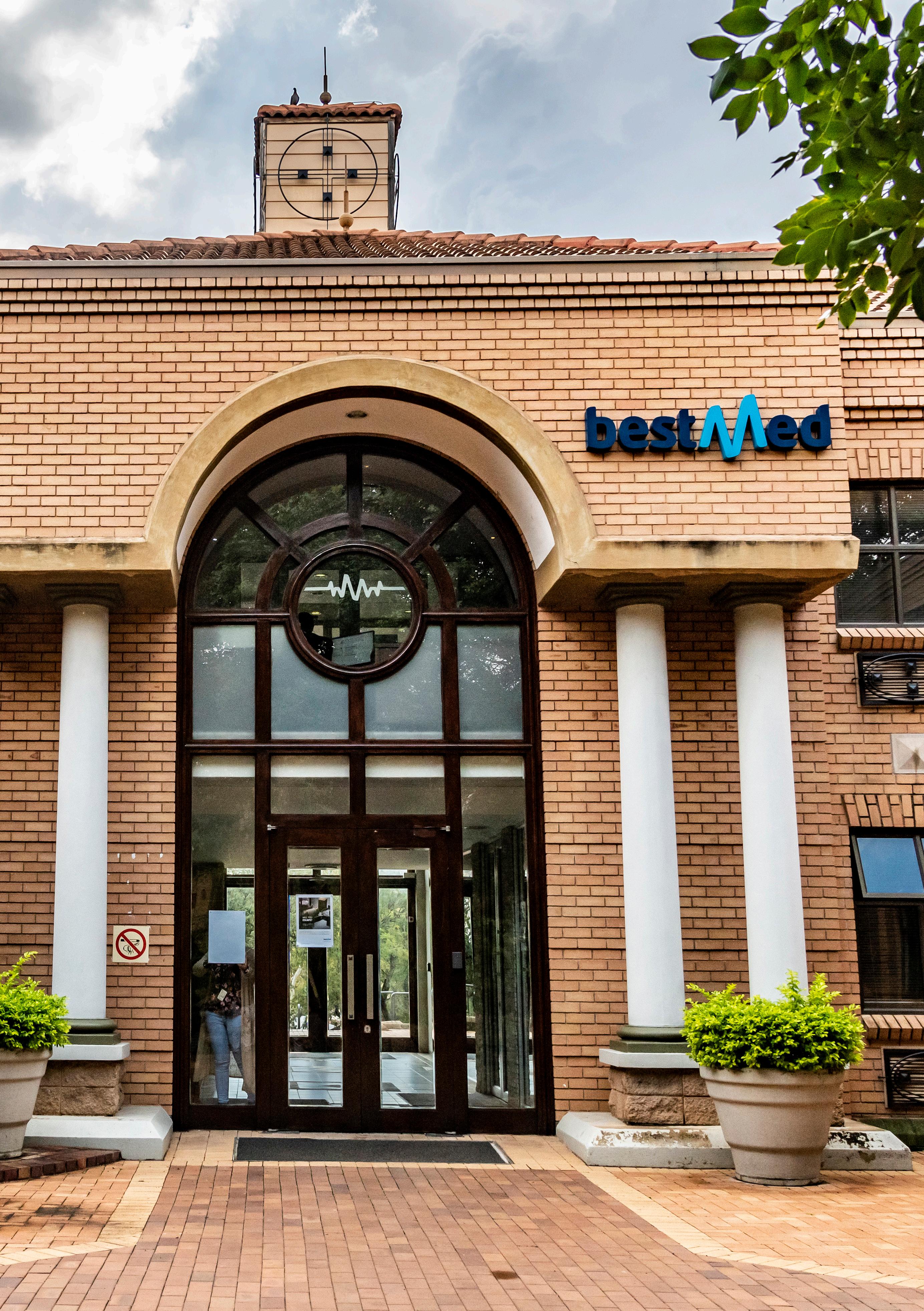
Bestmed 35
Rally the fleet
Boasting more than 30 years of experience within fleet management services, EQSTRA has become South Africa’s provider of choice, thanks to its personable approach and proprietary tech that makes it stand out from the competition
Editorial - Victoria South

EQSTRA

EQSTRA is a fleet optimisation specialist that has perpetually sought out opportunities to improves its offerings and lead the sector. Today, it operates out of 16 self-contained locations, spread across four countries, to maximise its impact for business clients. What makes the company stand out is its fully integrated model and platformbased transparency. The question is, why does anybody need a fleet management partner?
“Our job is to run your fleet effectively so you can focus on your business,” EQSTRA simply says. “We understand the hidden costs of running a fleet, we go out of our way to save our customers money. Through effective supplier management, fuel rebates, driver management, preventative maintenance, cost control and insight and exception reporting we save our +1200 customers on their fleet costs.”
A full complement of services
Businesses often don’t realise they need fleet management until the manpower savings are calculated. EQSTRA seeks to ducate potential clients as to the wasted human resource time that is spent dealing with time-consuming fleet admin. It states that every month it processes in excess of 5,000 traffic fines, manages more than 1,000 road traffic incidents, caters to all maintenance requirements, sorts roadside assistance and offers live tracking of more than 30,000 vehicles. That last element is particularly pertinent, as previously, fleets have been all but on their own once they have exited a depot. Now, all drivers can be safely monitored, located and managed at the push of a button, thanks to EQSTRA’s in-house tech.

“Our competitors follow our lead,” the company states. “In our quest to find a fleet management system addressing the very specific fleet management needs of every customer, we searched the world over and found all systems wanting. So we invested eight years and R250 million in building our own.”
The result is ‘Quest’. A uniquely flexible, customisable software that can be managed by EQSTRA but with full report and live tracking data for clients whenever they want it. The interface has proved so impressive that global fleet directors have admitted to never seeing something so comprehensive before. Additionally, competitors have cited the program as the ‘future of fleet
38 EQSTRA
management’. This has naturally led to some seeking to replicate the model or integrate similar functionality into their own offerings but so far, nobody has managed to recreate it.
Quest was designed to accommodate the fact that one size never fit all. In the case of fleet management, this is especially true. The sheer number of variables, from vehicle types to fuel, distances travelled, regions covered and cargo carried, means that an inherently malleable program is essential. Quest, therefore, is said to bring together start-of-the-art tech with accessible software to provide real time insights and full fleet control.
“Our expert approach is to first listen, then analyse fleet data that you may have (no obligation) and then prepare innovative but practical solutions geared to meet your needs exactly,” EQSTRA states.
This approach is what has garnered the company its industry-leading status and global recognition.










Savings across the board
Professional fleet management has one goal: to save clients money. EQSTRA accomplishes this and more. By assessing existing fleets, the company

is able to make suggestions as to how streamlining can be accomplished. It can also integrate all necessary annual tasks, such as taxation, insurance and maintenance. Essentially, EQSTRA, with its app and desktop platform, can undertake the roles of multiple staff, freeing them up to concentrate on more business-critical matters. The result is accurate data reporting, real-time analysis of ongoing costs and opportunities to adapt to meet flexible budget requirements.
The conflict in Ukraine is a perfect example of why fleet management is such a valuable tool. With sanctions placed on Russia, the price of crude oil has skyrocketed. This has had a drastic impact on the rising cost of fuel, with implications for fleets across the world. There has never been a greater need for effective fuel tracking.
“Having a system in place that tracks every cent spent on fuel and every kilometre covered, means you have an accurate picture of which vehicles/ drivers are the most efficient, and which may be problematic. This gives you the information with which to decide whether certain vehicles are no longer performing up to standard, or whether you need to address driver performance


EQSTRA 39

40 EQSTRA
concerns,” EQSTRA states. “In addition to tracking fuel efficiency, you can include automated fuel card tracking that will immediately alert you to possible fraudulent tracking. Many companies save thousands, if not millions, of Rands each year by implementing fuel tracking systems.”
Asking hard questions
EQSTRA acknowledges that fleet management is unlikely to light everybody’s world on fire. It states that the admin side, in particular, is a necessity rather than a pleasure, but goes on to highlight that this attitude could be allowing vital information to slip through the cracks of traditional management efforts. The company asks fleet managers to think about if they are truly utilising every facet of available data to reduce costs and create a more efficient fleet. If not, it suggests moving to an outsourced fleet partner such as itself.

“If you think that even a small percentage of your admin is not up to par, it is well worth consulting with a fleet partner. You’ll be surprised by how much time and money you can save by streamlining your fleet admin tasks,” EQSTRA says.
Following the Covid-19 outbreak and with the Ukrainian conflict in progress, external factors are increasingly impacting South African businesses. EQSTRA aims to be a valuable source of administrative support, leaving businesses free to focus on their clients and other critical operational issues. This is all but guaranteed to prove vital for some companies’ survival in 2022.
EQSTRA 41
“You’ll be surprised by how much time and money you can save by streamlining your fleet admin tasks…”
Supporting South African growth
As the only vertically integrated phosphate producer in South Africa, Foskor has created a unique position for itself, with growth as a focal point for every facet of the company Editorial - Victoria South
 Foskor
Foskor
Phosphates and phosphoric acid are essential components for fertilisers. Said soil additives help to bolster crop stability and in turn, economic security. This is the bigger picture that has to be taken into account when looking at a company such as Foskor.
It would be simple to assume that producing phosphates and phosphoric acid is a niches enterprise, but the endeavour supports a wide range of other industries and livelihoods. This makes Foskor a South African giant, and its vertically integrated model demonstrates an astute awareness of the need for self-reliance. Split into two factions, mining and acid division, the company maintains a clear focus on its individual activities while supporting something much bigger than itself.
From the ground, up
Foskor investigates and mines phosphate-bearing ores. Rock concentrate is processed and supplied for raising crop yields. Alongside, the acid division plant creates sulphuric and phosphoric acid, plus phosphatebased granular fertilisers. For this, phosphate rock is used as the base material. There’s little waste, no relying on external parties or strategic partnerships and a body of consumers waiting to buy finished products.
“About 84% of the mining division’s phosphate rock concentrate is railed

Foskor 43
to the acid division plant and the rest is sold externally,” the company explains. “The acid division exports phosphoric acid to India, Japan, Bangladesh, the Netherlands, Mexico and Dubai. Phosphoric acid has agricultural, industrial, medical and retail applications. Products made from phosphoric acid include catalysts, rust proofing materials, chemical reagents, latex, dental cements, tooth whiteners, toothpaste, disinfectants, food supplements, carbonated beverages, waxes, polishes and animal feeds, among others.”
Interestingly, Foskor has a policy that allows for certain divisions, each operating separately from each other, to be shut down as and when product demand is low. This is especially true of the granular fertiliser division. Saving operational costs and diverting manpower to where it’s needed represents a futureproofed way of working that few other operations appear to adopt.
Building on a legacy Foskor was founded in 1951, by the Industrial Development Corporation. It was initiated with a £1 million loan from the same. It’s primary focus remains the same today as it was then: to mine phosphate rock for the production of acids and fertilisers. Rock is mined and beneficiated at Phalaborwa, in the Limpopo Province, before being carried, by rail, to the processing plant in Richards Bay, KwaZulu-Natal. By making every waste products saleable commodities, in the form of finished acids, Foskor secures incomes along the full value chain.
A value-added offering ties in with the mission that Foskor works to. It seeks to “create value and profit by converting opportunities with determination, responsibility and sustainability.” That last claim is a tough one to live up to for many companies, but any operation involved with mining or acid production has it tougher than most. Foskor, however, is transparent about the ways it supports environmental stewardship.

44
“Foskor gives feedback on its environmental performance at a quarterly Environmental Forum…”
Foskor
Mining for a sustainable future “Foskor gives feedback on its environmental performance at a quarterly Environmental Forum with stakeholders from the industry, local and national government bodies, residents and other interested and affected parties,” the company states. “The Mining Division in Phalaborwa also used annual Water Week to raise stakeholder awareness of Foskor’s role in protecting water sources in the Kruger National Park.”
Water use is something Foskor appears to take seriously. Its Richards Bay facility currently uses in the region of 10 megalitres a day. Authorised to use up to 17.6 megalitres daily, the company offsets it use by recirculating storm water, recycling waste water from other companies and installing filtration systems to create potable water on site. This responsibility is carried forward into plant and wildlife protection initiatives as well.
With large machinery and multiple personnel moving across sites perpetually, Foskor has sought to minimise their impact on the landscape. Protection programs include marking cattle with reflectors to prevent them being hit on the roads at night and monitoring plant species in the vicinity of working areas. Where needed, the company ‘resuscitates’ the environment, repopulating any lost species of plants and protecting natural biodiversity.
Extensive recycling, use of renewable energy and waste-to-energy systems and air quality monitoring round out the vast commitments that Foskor makes to upholding commercial profitability, but not at the expense of the environment.
“Foskor recognises that sustainable development links opportunity with responsibility,” the company claims. “Sustainable development raises competitiveness and allows for more informed production, taking damage to the environment into consideration. Socially responsible behaviour spreads
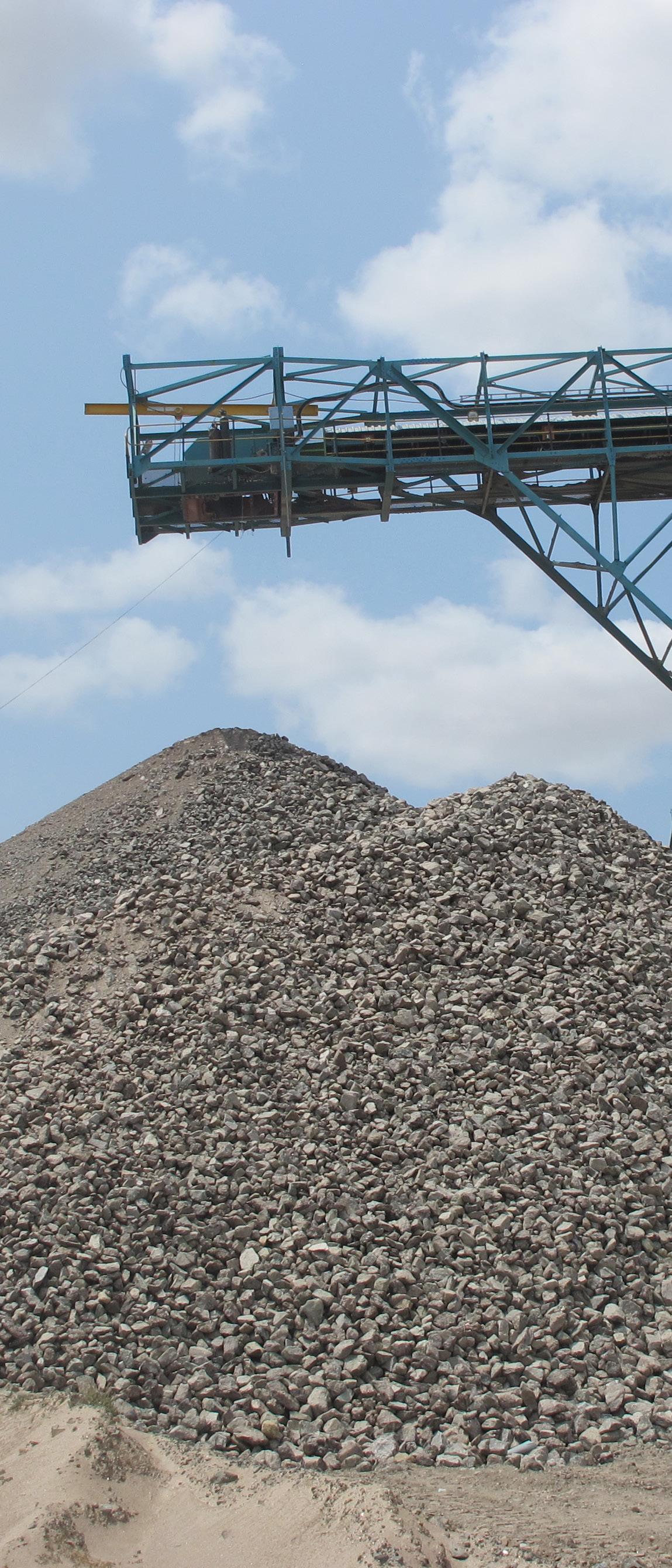
Foskor 45
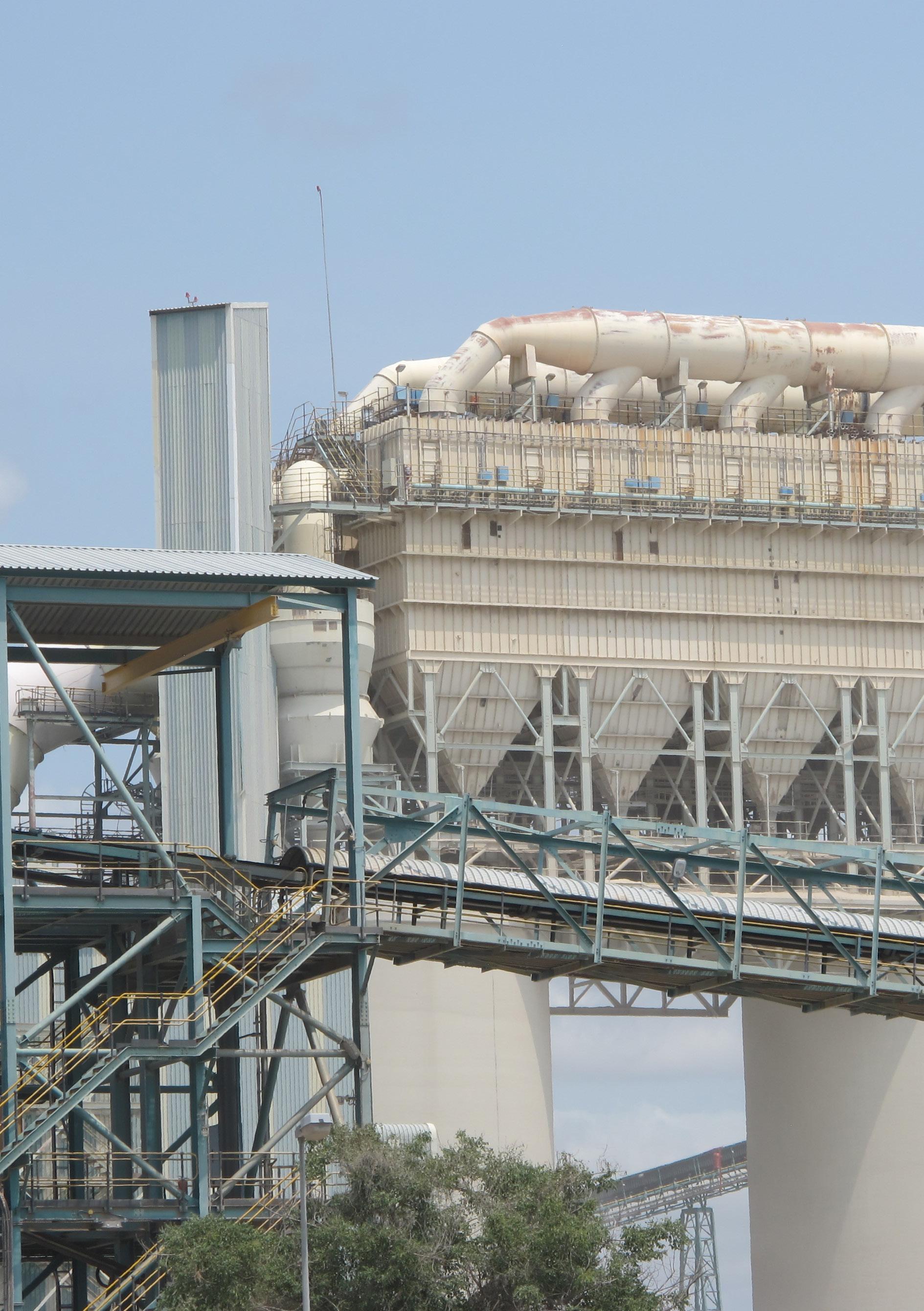
46 Foskor
economic wealth equitably and brings a better quality of life to those affected by the operation’s daily activities.”
Tackling the uncomfortable issues
Foskor is a successful operation because it has remained focused on the tasks it was founded to complete. Gaining expertise along the way, building out a larger portfolio of products and consumers and hiring the right people has allowed the company to grow at a pleasing rate. However, there is something that sets Foskor apart from many of its competitors: an acknowledgement that where it has come from is socioeconomically complex.
“As an industry, we need to understand and acknowledge ort history, however uncomfortable, if we are to properly address the challenges that continue today. Only if we do this, will we move forward as a sector and as a nation. At Foskor we are working to help restore confidence in our industry and in the country. It is our responsibility to help SA address the legacies of its past by helping to alleviate the triple challenges of poverty, inequality and unemployment,” Foskor pledges.
Moving forward
Addressing its past, overcoming operational shutdown during the Covid-19 outbreak and maintaining profitability hasn’t been simple for Foskor but it has managed. Today, it stands as a proudly South African company, engaged in operations that allow other domestic industries to flourish, while also bringing in export revenue. As it continues to prioritise sustainability, it seems possible that a new era for South African mining firms could be on the horizon, as it only takes one to lead by example.
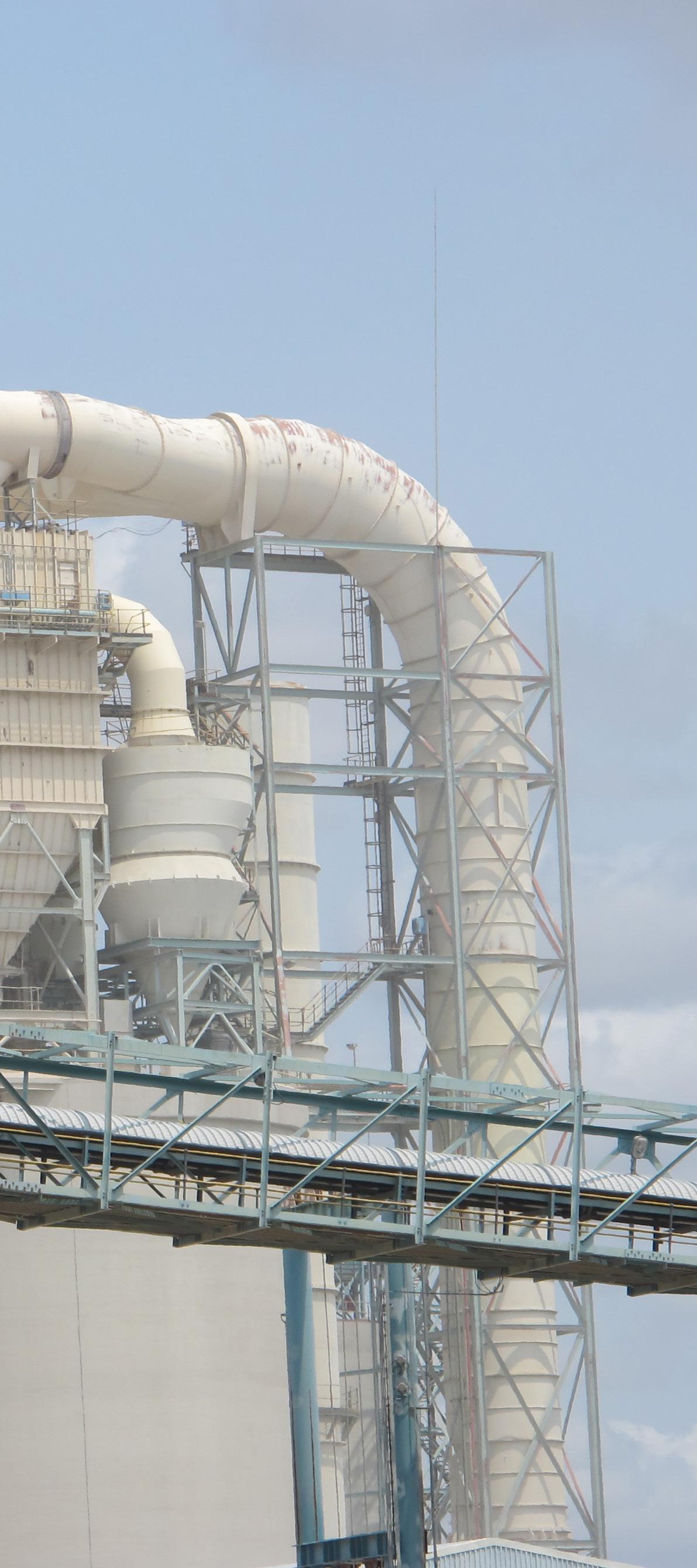
Foskor 47
“Sustainable development raises competitiveness and allows for more informed production…”

2013 -18 Sunday Times Top Brands #1 Business Bank Taking the struggle out of switching That’s how we help. For more information, contact: Fathima Rahman Eloise Heyduczek Email: frahman@fnb.co.za I Call: 087 328 0280 Email: eloise.heyduczek@fnb.co.za I Call: 087 335 6859 Switching your business is one of the most important decisions you’ll ever make. This is why we proactively manage the transition for you, to ensure minimal disruption to your business. We take end-to-end accountability until your business is fully banked, and a Business Banker is in play to look after the day-to-day relationship. It takes a bank that does more to help you start, run and grow your business. A division of FirstRand Bank Limited. An authorised Financial Services and Credit Provider (NCRCP20). FNB Business



















 Donnie Rust
Chemical Process Technologies
Donnie Rust
Chemical Process Technologies













































 Foskor
Foskor





